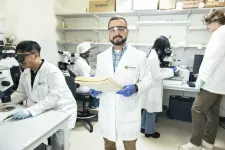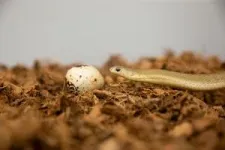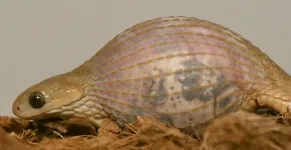(Press-News.org) Kennesaw State University biology professor Brandon Carpenter was inspired to pursue a career in science because of an undergraduate research experience. With a recent grant from the National Institutes of Health (NIH), he’ll provide a similar experience to his students.
Carpenter, an assistant professor of cellular and molecular biology who studies neurodevelopmental disorders and genetic mutations, received a $432,000 grant to continue research that will help uncover the mechanisms that regulate inheritance of epigenetic states, or “cellular memories,” from one generation to the next. In doing so, his work will shed light on how cellular memories are inherited between generations, and what happens to normal development when those memories aren't inherited properly.
“What got me into science, and what I'm really interested in, is inspiring undergraduates, bringing authentic research experiences into the lab for them,” he said. “This grant will give students the opportunity to do research and be prepared for the next step in their careers.”
Most of the money will go toward funding a group of undergraduate and graduate researchers in his lab, where they use a microscopic nematode, Caenorhabditis elegans (C. elegans), that shares half its genes with humans, to study the mechanisms that underlie neurological disorders. Due to the short life span and ease of manipulating nematodes, student researchers can easily execute experiments and generate publishable data, often within a single semester.
“We can take out a C. elegans gene and put in a human version of that gene and it can rescue that gene, and the worm can function very similarly to the way it did when it had its normal gene,” Carpenter said. “We are able to study basic mechanisms in the worm and it’s directly relevant to what’s happening in humans.”
He said the overall goal of his research is to study how inappropriate inheritance of epigenetic states affects normal tissue development and function. Because the enzymes that Carpenter studies that regulate epigenetic inheritance are conserved in humans, his work will provide insight into how medical professionals might intervene to treat patients with these disorders.
“By studying how these cellular memories turn on the wrong way and affect tissues, we can start to understand the mechanisms of how these patients that have mutations in these same enzymes that regulate the cellular memory have the phenotypes they do,” he said.
Carpenter said he hopes to open his laboratory and research to more students, offering similar research experiences to the ones that directed him toward his career as a professor and researcher.
“When you can support a student financially so they can show up in your lab and get paid, it helps alleviate other things in life that they're dealing with, and it broadens the net of different types of students with different life situations that can participate in research experiences,” he said.
END
Grant to help students continue research in nematodes
Kennesaw State biology professor will create research opportunities for students through NIH grant
2023-08-25
ELSE PRESS RELEASES FROM THIS DATE:
Move over pythons: These snakes are the real champion eaters
2023-08-25
Pythons have huge appetites, but which snake would win an eating contest?
Surprisingly, it’s a harmless little African snake that consumes eggs whole like an amuse-bouche.
Biologist Bruce Jayne at the University of Cincinnati discovered that this species, Dasypeltis gansi, can consume bigger prey relative to its own length and mass than even Burmese pythons, among the most massive snakes on Earth.
“They probably would hold the Guinness world record,” said Jayne, a professor of biological sciences in UC’s College of Arts and Sciences.
“It’s spectacular but on a small scale,” he said. ...
Families with a team mindset strengthened their bonds during COVID-19 pandemic
2023-08-25
Despite reports of families disintegrating under the hardships and constraints of the COVID-19 pandemic, a new study suggests that many families may have formed stronger bonds instead.
One key difference between families that emerged from the pandemic stronger and unified compared with those that struggled was having a cohesive, family-oriented mindset. Families in which individuals perceived themselves as members of a team who were working for their collective benefit and found personal fulfillment in meeting the wants and needs of the other members were more likely to improve their ...
New human cell-based 3D model reveals insights into how immune cells contribute to Alzheimer’s disease
2023-08-25
Key Takeaways
Researchers developed a new 3D model of Alzheimer’s Disease that allows them to study the role of immune cells in the disease
They found that infiltration of immune cells significantly increases in brains with AD pathology and contributes to neurodegeneration and neuroinflammation
The team also identified potential strategies to halt this process, which could lead to the development of new therapies
BOSTON – Cognitive decline associated with Alzheimer’s disease (AD) develops when neurons begin to die, which can be caused by inappropriate immune responses and excessive ...
Spending on mental health services has risen by more than 50% since beginning of pandemic
2023-08-25
Spending on mental health services among Americans with private health insurance has surged since the beginning of the COVID-19 pandemic, continuing to rise even as the use of telehealth has plateaued, according to a new study.
Spending on mental health services rose by 53% from March 2020 to August 2022 among a large group of people with employer-provided insurance, according to researchers from the RAND Corporation and Castlight Health. During the same period, use of mental health services increased by 39%.
The researchers say it is uncertain if the trend will continue since some rules that expanded payment for telehealth ...
Patient experiences with hospitals worsened during first two years of pandemic
2023-08-25
The experiences of patients hospitalized during the COVID-19 pandemic was significantly worse than in the years before the crisis, with hospitals with higher staffing levels holding on to better scores longer, according to a new RAND Corporation study.
Patients particularly reported worse staff responsiveness and hospital cleanliness, possibly reflecting staffing shortages in the hospital workforce and the effects of protocols needed to limit the spread of COVID-19, according to researchers.
Deficits were largest for hospitals that in the pre-pandemic period were lower-performing and had lower staffing levels. ...
Changes in patient experiences of hospital care during the pandemic
2023-08-25
About The Study: The results of this study suggest that higher-staffed and higher-performing hospitals were more resilient to the conditions of the COVID-19 pandemic, but by late 2021, patients’ experience of care had declined in all hospitals.
Authors: Marc N. Elliott, Ph.D., of the RAND Corporation in Santa Monica, California, is the corresponding author.
To access the embargoed study: Visit our For The Media website at this link https://media.jamanetwork.com/
(doi:10.1001/jamahealthforum.2023.2766)
Editor’s Note: Please see the article for additional information, including other authors, author contributions ...
COVID-19 pandemic and associated inequities in heart attack treatment, outcomes
2023-08-25
About The Study: This study found that while the pandemic was associated with worse treatment and outcomes in patients with acute myocardial infarction (AMI; heart attack), race and ethnicity–associated inequities did not increase significantly. These findings suggest the need for additional efforts to mitigate outcomes associated with the COVID-19 pandemic for patients admitted with AMI when the hospital COVID-19 burden is substantially increased.
Authors: Laurent G. Glance, M.D., of the University of Rochester ...
Tides may be responsible for up to 69% of under-ice melting in an Antarctica ice shelf
2023-08-25
The ice shelves — the marine-terminating glaciers of the Antarctic Ice Sheet — are melting, and it's not just because of rising atmospheric temperatures. In a one-two punch, ice shelves in Antarctica are fighting a losing battle against rising temperatures both at the surface and under their body. Called basal melting, oceanic heat and compression contribute to the phenomenon, but tides may play a bigger role than previously thought, according to a multi-institution research collaboration based in China. Based on observational data in Prydz Bay, which ...
PolyU scholar’s transformative work on the Leidenfrost effect wins the Falling Walls Science Breakthroughs of the Year 2023
2023-08-25
Prof. Zuankai WANG, Associate Vice President (Research and Innovation) and Chair Professor of Nature-Inspired Engineering at The Hong Kong Polytechnic University (PolyU) has been bestowed one of the 10 winners of the Falling Walls Science Breakthroughs of the Year 2023 in Engineering and Technology category for his groundbreaking work on resolving the Leidenfrost effect.
The Award aims to foster research and innovation across all disciplines by celebrating cutting-edge discoveries. The Falling Walls Foundation, based in Berlin, established the Award to acknowledge the most recent breakthroughs in science and society worldwide.
Prof. WANG’s ...
Half as many AF patients dying of heart attacks and strokes in the UK
2023-08-25
University of Leeds news
Embargo: 25 August 2023, 12.30pm CEST
Patients living with one of the UK’s most common heart rhythm conditions are 50% less likely to die from a heart attack or stroke than they were at the start of the millennium, new research has found.
Analysis of the health records of more than 70,000 patients newly diagnosed with atrial fibrillation (AF) showed that mortality from related cardiovascular and cerebrovascular diseases more than halved over the 16-year study period.
AF is associated with an increased risk of stroke.
The research showed that dementia ...
LAST 30 PRESS RELEASES:
Novel camel antimicrobial peptides show promise against drug-resistant bacteria
Scientists discover why we know when to stop scratching an itch
A hidden reason inner ear cells die – and what it means for preventing hearing loss
Researchers discover how tuberculosis bacteria use a “stealth” mechanism to evade the immune system
New microscopy technique lets scientists see cells in unprecedented detail and color
Sometimes less is more: Scientists rethink how to pack medicine into tiny delivery capsules
Scientists build low-cost microscope to study living cells in zero gravity
The Biophysical Journal names Denis V. Titov the 2025 Paper of the Year-Early Career Investigator awardee
Scientists show how your body senses cold—and why menthol feels cool
Scientists deliver new molecule for getting DNA into cells
Study reveals insights about brain regions linked to OCD, informing potential treatments
Does ocean saltiness influence El Niño?
2026 Young Investigators: ONR celebrates new talent tackling warfighter challenges
Genetics help explain who gets the ‘telltale tingle’ from music, art and literature
Many Americans misunderstand medical aid in dying laws
Researchers publish landmark infectious disease study in ‘Science’
New NSF award supports innovative role-playing game approach to strengthening research security in academia
Kumar named to ACMA Emerging Leaders Program for 2026
AI language models could transform aquatic environmental risk assessment
New isotope tools reveal hidden pathways reshaping the global nitrogen cycle
Study reveals how antibiotic structure controls removal from water using biochar
Why chronic pain lasts longer in women: Immune cells offer clues
Toxic exposure creates epigenetic disease risk over 20 generations
More time spent on social media linked to steroid use intentions among boys and men
New study suggests a “kick it while it’s down” approach to cancer treatment could improve cure rates
Milken Institute, Ann Theodore Foundation launch new grant to support clinical trial for potential sarcoidosis treatment
New strategies boost effectiveness of CAR-NK therapy against cancer
Study: Adolescent cannabis use linked to doubling risk of psychotic and bipolar disorders
Invisible harms: drug-related deaths spike after hurricanes and tropical storms
Adolescent cannabis use and risk of psychotic, bipolar, depressive, and anxiety disorders
[Press-News.org] Grant to help students continue research in nematodesKennesaw State biology professor will create research opportunities for students through NIH grant






